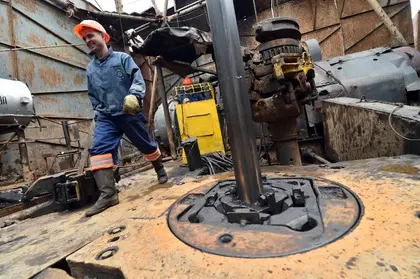Parliament
passed the legislative
package on July 31 with more than 300 votes.
In force
until the end of the year, gas drillers will now have to pay 55 percent of
their subsoil revenue instead of 28 percent for extracting the blue fuel
beneath 5 kilometers, and 28 percent instead of 15 percent for beyond 5 kilometers.
An earlier version of the bill had a 70 percent tax rate for gas extraction, but
parliament agreed to address the private sector’s complaints about this.
Privately-owned
companies involved in oil and gas extraction in Ukraine, including Geo-Alliance
Group, Kub-Gaz, Naftogazvydobuvannya, Poltava Petroleum Company, Smart-Energy,
published a letter addressed to Prime Minister Arseniy Yatseniuk and relevant
parliamentary committees on July 29 to voice their disagreement with the new
rates.
Meanwhile,
the oil sector saw their tax rates grow to 45 percent for drilling beneath 5 kilometers,
while previously it was 39 percent. The tax rate for producing oil from beyond
5 kilometers increased by 3 percentage points – to 21 percent.
“The
draft law may lead to a rapid increase in the tax burden on private gas
producing companies, a significant decrease in project cost effectiveness in
general (up to closing down due to unprofitability) and a general decrease in
attractiveness of the Ukrainian market for foreign investors,” reads the open
letter, which was filed two days ahead of the vote.
One of
the strongest arguments made by the companies is the reference to the average
subsoil taxation level in European countries which does not exceed 20 percent, they
said.
Dmitry Marunych, co-founder of the
Energy Strategies Fund, added that for a natural gas importing country, the
rate of rent for gas production should not be higher than 20-30 percent.
“The
private sector requires at least $300-$500 million per year just to support the
current level of production,” reads the document. The increased tax burden,
market players believe, will not allow companies to reinvest their profits in
further exploration.
On the
other side, government is intensively seeking new revenue sources amid a
shortfall and expectations that the economy will contract by as much as 6.5
percent this year. It shrunk 4.7 percent in the second quarter, over the same
period as last year. Russia’s annexation of Crimea and the ongoing war with
Kremlin-backed separatists in two easternmost regions are significantly reducing
its tax base, while increasing the need to fund the war effort and repair
damaged infrastructure.
“Burden
sharing might become a recurring theme going forward, with the International
Monetary Fund program needing to be revamped,” commented Timothy Ash,
Standard Bank’s emerging markets analyst, referring to the $17 billion aid
package provided by the IMF for Ukraine to stabilize its economy.
Andriy Chubyk,
energy analyst for think-tank Strategy XXI, explains that this is a temporary
measure which will be effective for no more than half a year. “I don’t see
it as a risk for our energy security at all,” he said addressing the argument
that the current measures may depress domestic gas extraction which is a
critical part of a policy aimed at reducing gas dependence from Russia, which
supplied around 60 percent of the gas Ukraine’s economy consumed in 2013.
“Private
(oil and gas extracting) companies are owned by the several oligarchs which
used to be close to power, and they won’t suffer much,” Chubyk adds. He
believes current taxation is an effective compromise between the government and
private businesses.
Domestic
gas extraction for the first six months of this year grew by 1.3 percent to
reach 9.8 billion cubic meters, while oil production is down 4.3 percent to 1
million tons, according to the State Statistics Service.
The share
that private oil and gas producers hold does not exceed 15 percent, according
to Gennadiy Kobal, expert for Newfolk, an energy consultancy. The amount of
privately extracted gas grew by 33 percent and reached 1.4 billion cubic meters
as of end of June, while private oil production increased by 10 percent.
“The
sharp difference between (how) private and public companies work is the main
feature of Ukrainian oil and gas production. State-owned Ukrgazvydobuvannya and
Ukrnafta, which belong to state-owned oil and gas company Naftogaz are
experiencing hard times, while private companies are developing quite
intensively,” he wrote in an article
for Ekonomichna Pravda.
Oleksiy Timofeyev,
chief executive officer for Smart Holding that runs its energy assets through
Smart Energy subsidiary, has emphasized how difficult gas exploration in
Ukraine is, given the extensive usage of local subsoil by the Soviet economy
which exhausted the country’s energy resources.
Other measures for increasing tax revenues
The law additionally
introduced a 1.5 percent “war” income tax which will be used exceptionally for
Ukraine’s military needs. State-owned Ukrzaliznytsya will have to pay 20
percent of value added tax on its ticket sales for the high-speed trains
categorized as Intercity+, which will likely lead to increased ticket prices.
Besides
making energy extractors pay more, the government cancelled tax preferences for
renewable energy projects and introduced a $130 tax on alternative motor fuel
per 1,000 kilograms.
Iron ore
producers also face an 8 percent tax instead of 5 for access to ore deposits.
Moreover,
alcohol producers since now will have to pay standard spirit fares for
producing balms and infusions stronger than 8.5 percent.
You can also highlight the text and press Ctrl + Enter






Comments (0)